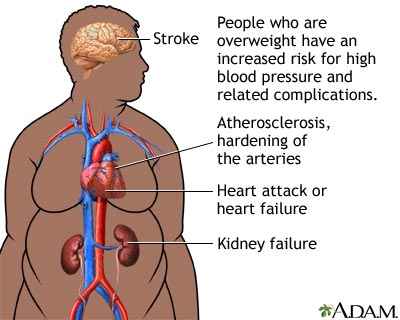Health Topics
Obesity means weighing more than what is healthy for a given height. Obesity is a serious, chronic disease. It can lead to other health problems, including diabetes, heart disease, and some cancers.
People with obesity have a higher chance of developing these health problems:
- High blood glucose (sugar) or diabetes.
- High blood pressure (hypertension).
- High blood cholesterol and triglycerides (dyslipidemia, or high blood fats).
- Heart attacks due to coronary heart disease, heart failure, and stroke.
- Bone and joint problems. More weight puts pressure on the bones and joints. This can lead to osteoarthritis, a disease that causes joint pain and stiffness.
- Sleep apnea or breathing pauses during sleep. This can cause daytime fatigue or sleepiness, poor attention, and problems at work.
- Gallstones and liver problems.
- Some cancers.
Three things can be used to determine if a person's weight gives them a higher chance of developing obesity-related diseases:
- Body mass index (BMI)
- Waist size
- Other risk factors the person has (a risk factor is anything that increases your chance of getting a disease)

Body Mass Index
Experts often rely on BMI to determine if a person is overweight. The BMI estimates your level of body fat based on your height and weight.
Starting at 25.0 (using your height in meters and weight in kilograms), the higher your BMI, the greater is your risk of developing obesity-related health problems. These ranges of BMI are used to describe levels of risk:
- Overweight (not obese), if BMI is 25.0 to 29.9
- Class 1 (low-risk) obesity, if BMI is 30.0 to 34.9
- Class 2 (moderate-risk) obesity, if BMI is 35.0 to 39.9
- Class 3 (high-risk) obesity, if BMI is equal to or greater than 40.0
There are many websites with calculators that give your BMI when you enter your weight and height.
For individuals, BMI is a screening tool, but it does not diagnose body fatness or health. Your health care provider can evaluate your health status and risks. If you have questions about your BMI, talk with your provider.
Other methods to measure body fatness include skinfold thickness measurements (with calipers), underwater weighing, bioelectrical impedance, dual-energy x-ray absorptiometry (DXA), and isotope dilution. However, these methods are not always readily available.
Waist Size
Women with a waist size greater than 35 inches (89 centimeters) and men with a waist size greater than 40 inches (102 centimeters) have an increased risk for heart disease and type 2 diabetes. People with "apple-shaped" bodies (waist is bigger than the hips) also have an increased risk for these conditions.

Risk Factors
Having a risk factor for a disease doesn't mean that you will get the disease. But it does increase the chance that you will. Some risk factors, like age, race, or family history can't be changed.
The more risk factors you have, the more likely it is that you will develop the disease or health problem.
Your risk of developing health problems such as heart disease, stroke, and kidney problems increases if you have obesity and have these risk factors:
- High blood pressure (hypertension)
- High blood cholesterol or triglycerides
- High blood glucose (sugar), a sign of diabetes
These other risk factors for heart disease and stroke are not caused by obesity:
- Having a family member under the age of 50 with heart disease
- Being physically inactive or having a sedentary lifestyle
- Smoking or using tobacco products of any kind
Summing it up
You can control many of these risk factors by changing your lifestyle. If you have obesity, your provider can help you begin a weight-loss program. A starting goal of losing 5% to 10% of your current weight will significantly reduce your risk of developing obesity-related diseases.
References
Centers for Disease Control and Prevention website. About obesity. www.cdc.gov/obesity/php/about/index.html. Updated January 23, 2024. Accessed July 23, 2025.
Hafida S, Apovian CM. Obesity and neuroendocrine control of energy stores. In: Melmed S, Auchus RJ, Goldfine AB, Koenig RJ, Rosen CJ, Kopp PA, eds. Williams Textbook of Endocrinology. 15th ed. Philadelphia, PA: Elsevier; 2025:chap 40.
Jensen MD, Bessesen DH. Obesity. In: Goldman L, Cooney KA, eds. Goldman-Cecil Medicine. 27th ed. Philadelphia, PA: Elsevier; 2024:chap 201.
Keating MK, Woodruff RK, Saner EM. Management of obesity: office-based strategies. Am Fam Physician. 2024;110(2):145-156. PMID: 39172672 pubmed.ncbi.nlm.nih.gov/39172672/.
Test Your Knowledge
Review Date 7/3/2025
Updated by: Linda J. Vorvick, MD, Clinical Professor Emeritus, Department of Family Medicine, UW Medicine, School of Medicine, University of Washington, Seattle, WA. Also reviewed by David C. Dugdale, MD, Medical Director, Brenda Conaway, Editorial Director, and the A.D.A.M. Editorial team.





